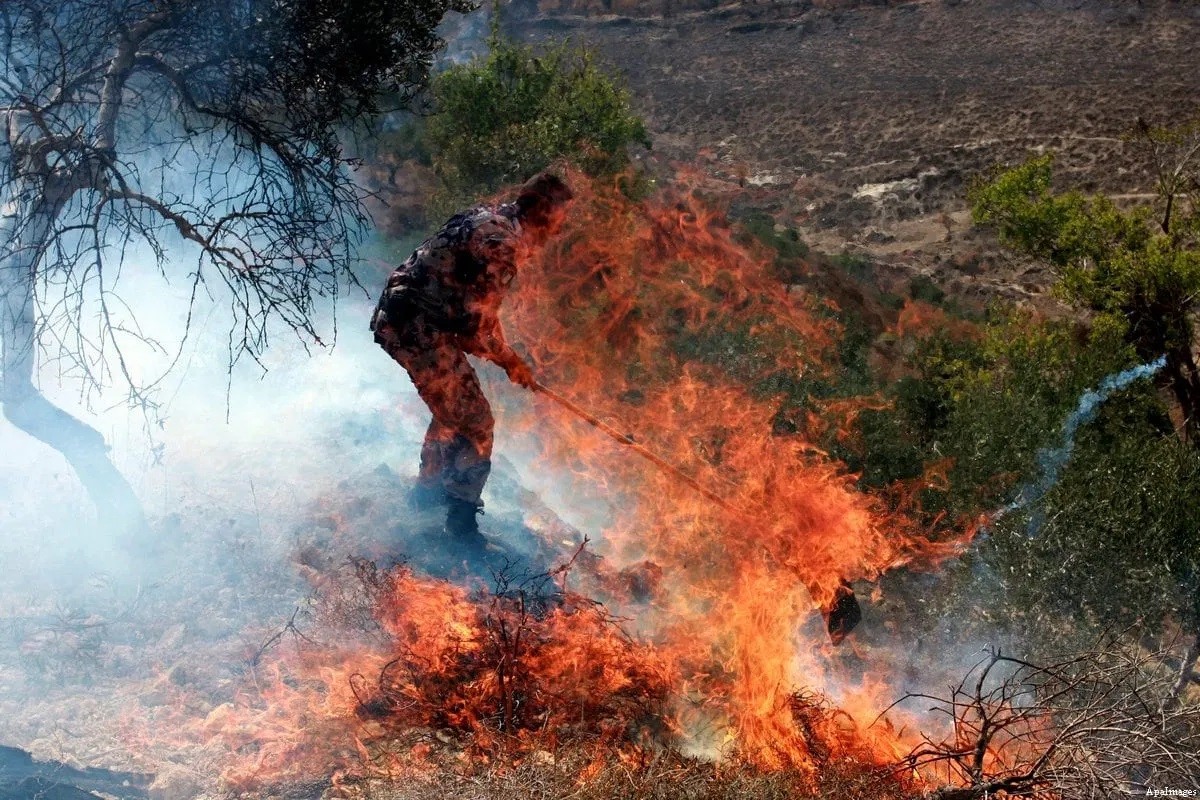
The Israeli-Palestinian question has tragically returned to the center of the international debate. From May 10 to 20, 256 Palestinians (including 66 children) and 13 Israelis were killed, more than a thousand injured were killed and 156 buildings razed to the ground[1] in the war between the fundamentalist government of Bibi Netanyahu in Israel and Hamas – the fundamentalist movement which governs the Gaza Strip. The ceasefire has been in effect since May 21 and was signed thanks to the mediation of the Cairo regime which reached a new compromise on the persecution of the Muslim Brotherhood, which is the reason why a coup d’etat was carried out in Egypt[2].
Nonetheless, no one can know if and for how long the Hudna[3] will hold, as the reasons for the Palestinian uprising and the violent Israeli reaction not only remain unexplained, but have not even been discussed[4]. First of all, the problem of defining and allocating territory. Once again, hatred prevailed over reason. Once again, we must count the casualties among civilians, many children and destroyed infrastructure: May 10 (special symbolic day when Israel celebrates “Jerusalem Day” to commemorate its annexation after the Six Day War of 1967[5]) , while during Ramadan (the holy month for Muslims), the Israeli authorities decided to install new checkpoints at the entrance to the Damascus Gate, the main entrance to the Old City of Jerusalem, which would prevent thousands of Palestinians from reaching the Al-Aqsa Mosque and allowing their cultivation to train[6].
The result: violent clashes between Israeli police and Palestinians outside the Al-Aqsa Mosque; near the mosque, in the Sheikh Jarrah neighborhood, demonstrations against the Israeli government, which announced the expulsion of some Palestinian families living in this neighborhood for the benefit of Jewish settlers. Israeli security agents broke into the Al-Aqsa Mosque and threw stun grenades at the Palestinians. An attack on one of the holy places of the Islamic religion during the month of Ramadan. Hence the launching of Hamas rockets from the Gaza Strip to Jerusalem in the western Negev and Israel’s immediate reaction to the launching of rockets by the radical Islamic movement[7].
In recent years, the Temple Mount has been the scene of attacks by Israeli fundamentalist groups. They demanded the destruction of the Al-Aqsa Mosque and the Dome of the Rock. For the representatives of the Islamic Foundation, the guardians of the mosque, a religious foundation supported by Jordan (guardians of the holy places), the Israeli fundamentalists want the holy place to be subordinated to the Office of Antiquities and thus deprived of its religious meanings[8] . On May 27, the United Nations Human Rights Council established a commission of inquiry into the violence in the occupied Palestinian territories, including East Jerusalem[9]. Former Chilean President Michelle Bachelet, high commissioner for human rights, said that the Israeli army’s attacks on Gaza could constitute a war crime “if it turns out that civilians were not affected without discernment”[10].
Correct, but insufficient. So many positions that claim not to see the great novelty of the Middle Eastern chessboard: since the Egyptian army of President Al-Sisi overthrew the democratic government in Cairo, that the Muslim Brotherhood (which is also at the origin funding for Hamas[11]) won in the election, Israel’s relative majority party, Bibi Netanyahu’s Likud, became one of the most staunch allies of the Egyptian regime, and the cause of the Palestinian people became the focus exchanges between these new friends[12].
An economy under military siege
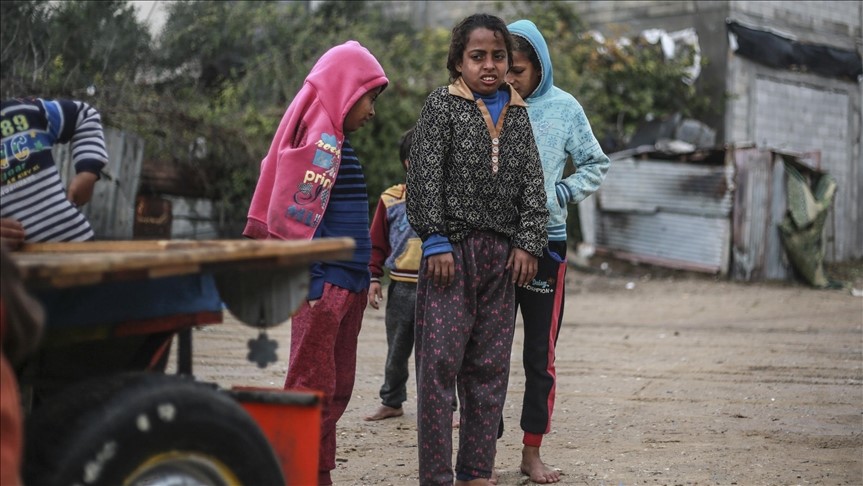
Hungry Palestinian children beg by the side of the road[13]
A very simple negotiation, because Palestine is a country completely surrounded by Israel and does not have its own self-sufficient economy. Whenever the inhabitants manage to cultivate a production of international interest, Israel expropriates them militarily (as was the case of the thousand-year-old olive trees[14] of the West Bank and the Galilee, which today are the source of one of the best oils in Europe, that of the landowners of the Meshek Achiya company[15]) or set it on fire and steal it by Jewish settlers [16]– or even go so far as to destroy it with their own fighter-bombers[17]. Or with pesticides[18]: the Jewish military uses flamethrowers or airlines (Chim-Nir and Telem Aviation) to distribute pesticides across the border that burn the leaves and roots of Palestinian farmers’ plants[19].
60% of the West Bank is under Israeli government control, and even in areas owned by Palestinians under international agreements, citizen access is made difficult by military controls. Thus, Palestine, more than a single nation, is a system (physically, economically and politically) divided into three zones: the West Bank, East Jerusalem and the Gaza Strip. The West Bank, in turn, is divided into three other zones (A, B and C) to make mobility as difficult as possible and to simplify Israeli military control[20].
Things just keep getting worse. According to the World Bank, 2020 turned out to be an even more difficult year after three consecutive years of economic growth below 2% as the Palestinian economy faced Covid-19 as well as a severe economic slowdown due to the declining demand in traditional export markets. In addition, there has been a deadlock in negotiations between the Palestinian Authority and the Israeli government (which has suspended the transfer of compensation funds) and a drastic reduction in foreign aid[21].
On December 1, 2020, Palestinian Prime Minister Mohammad Shtayyeh and European Union Representative in Palestine Sven Kühn von Burgsdorff presented an investment platform to facilitate access to foreign funds to support vital sectors such as ‘agriculture, transport, telecommunications, renewable energies, water resources and digital technologies: up to $ 100 million from a European subsidy and 410 others in the form of bank loans and guarantees[22] that arrive six months after the $ 41 million dollars donated by the European Union to enable the Palestinian Authority to pay public administration salaries[23].
There is no alternative: the Palestinian economy is a closed cycle, in which Israel and Hamas ensure that large industrial groups and large credit institutions cannot enter. Apartheid is present in everyday life and also in the financial sector[24]. The subsequent construction of the 465 km long security wall (2002), constructed with immense illegal departures from the 1967 permitted borders in favor of Israel, severely restricted the freedom of movement of the Palestinian population, with many other serious economic and social consequences[25].
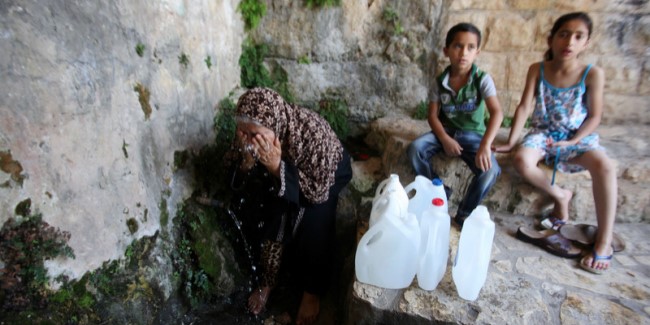
Daily scenes of Israel’s water apartheid imposed on Palestine[26]
The Palestinian Authority has been going through a severe fiscal crisis for many years, exacerbated by declining international donations (Egypt, Saudi Arabia and the United Arab Emirates having gone from friend to foe) and by Israeli politics, but also because Hamas derives great political benefit from keeping tensions high, as this party has based its own success on the anger and desperation of the Palestinian people, but has never been able to create peace because of the of its own internal corruption for decisions[27]. Israeli law thanks and doubles. A simple fact: the water supply wells were confiscated by the Israeli side of the lock. The Palestinian people no longer have access to water and the crops are threatened[28].
The Paris Protocol (1994) gave the Palestinian Authority formal control over tax revenues and the movement of agricultural and industrial products, but thus formalized an unfair customs union: the government of Israel, in violation of the protocol, restricted the movement of goods between Israel and the imposed territories (goods can flow from Israel to the territories, but not the other way around) and deliberately increased the time and cost of moving goods from an area of the West Bank to another[29].
75% of Palestinian trade depends on Israel for imports and 80% for exports, and any attempt at growth is nipped in the bud: Between 2016 and 2018, Israel only approved 3% of the country’s building permits. The economic blockade of the Gaza Strip[30], which began with Hamas’ electoral victory in 2007, has compromised border control, resources and the licensing system in much of Palestinian farmland – now in government hands Israeli[31].
The industriousness of the Palestinian people
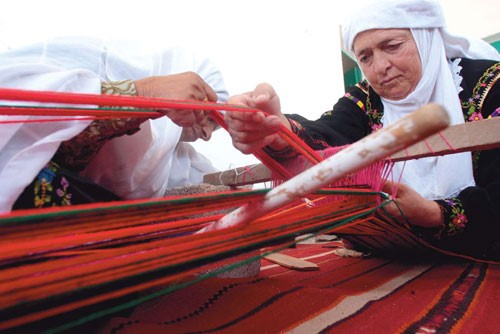
One of dozens of small textile companies run by Palestinian women[32]
90% of Palestinian GDP is generated by small and medium-sized enterprises – the conditions for the development of large enterprises are totally lacking. There are several reasons. For example, three currencies circulate in the Occupied Territories, the Israeli dinar, the Jordanian dinar and the US dollar. The Palestinian Authority has neither a central bank nor a currency of its own. Harassment from the Israeli army and settlers complicates every working day. Ine Eriksen Soreide, Norwegian Minister of Foreign Affairs and President of AHLC Palestine, asserted that “the Palestinian economy cannot develop its potential until the Palestinians have full access to their lands and resources and are able to move and trade freely in their own territories”[33].
Still, the economy is fertile, with a Palestinian GDP surpassing $ 14 billion in 2018, largely thanks to the IT sector, which accounts for 40% of the economy and employs a third of the population – in a country with a unemployment rate of 30%[34]. As an invading army, Israel does not invest in civilian infrastructure and does not prevent others from doing so. On the eve of the Oslo Accords (September 13, 1993), before the Gaza Strip became part of the Palestinian Authority, 5% of the inhabitants of Gaza and 26% of the inhabitants of the rural areas of the West Bank were without water; in the Gaza Strip, 38% had no sewage system and only 69% in the West Bank had 24/7 electricity[35].
However, the transition to the Palestinian Authority led to another recession as Israel began to block domestic trade, especially the flower trade[36], which is vital for Palestine[37]. The result has been the growing difficulty for Palestine, the virtual impossibility of producing in the West Bank and selling in the international markets of the Gaza Strip – so much so that the share of this trade in the GDP has increased from more than 50% to only 8%[38] in 5 years has decreased. Other banking restrictions imposed by Israel have also stifled the remittance income of Palestinian workers abroad[39], especially those from companies founded by young Palestinians around the world that have started marketing their local products to navigate the maze. and get out of the obstacles put in place. by the government of Jerusalem[40].
The best-known example is that of Nablus, a famous confectionery company whose activity in the West Bank was gradually made impossible by Israel: Raed Anabtawi, grandson of the founder, made a bold choice and in 2009 the company made moved to Oman. Today the young Al Arz Ice Cream Company, which employs 200 Palestinian workers (in Oman), produces tens of thousands of popsicles every day for the West Bank and Gaza Strip and has now started to expand globally. Arab with great success, such as a blend of Belgian chocolate, Polish milk, Danish technology and Palestinian recipes revered throughout Asia – in a situation where the Israelis cannot damage the factory or prevent workers from achieve work[41].
Since then, Oman has become the promised land of the new Palestinian economy, as evidenced by the success of the Al Anan Marble and Stone Company (jewelry store) and the Zaineb Gallery (trade in Palestinian art objects)[42]. Other historic companies, on the other hand, are much more in difficulty, and not always because of manpower difficulties: Hirbawi in Hebron, for example, has been Keffiyeh’s[43] main global company since 1961, and it was Chinese textile industry. who brought him to his knees because of them Today, a tenth of the original product is sold in the world for a tenth of the original product[44]. Anat International, which produces and sells both its own clothing and licensed designer clothing[45], is being held back by the smuggling of counterfeit products from the Persian Gulf[46]. To these enterprises must be added many companies, associations, foundations, NGOs and consortia, almost all of them headed by Palestinian women who sell national art products and antiques all over the world[47].
The economic independence denied
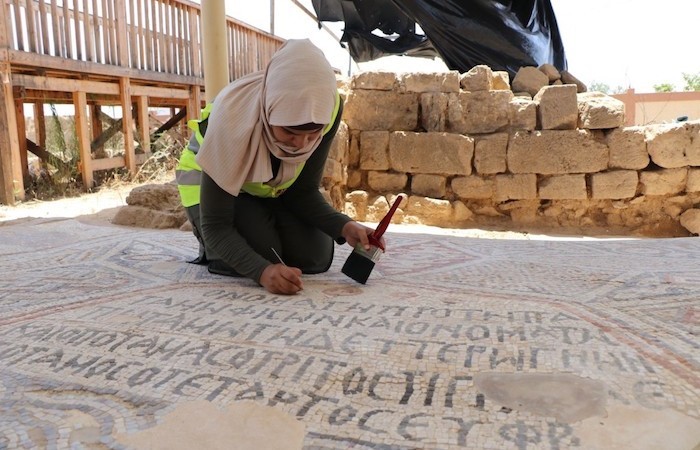
The patient restoration of the archaeological ruins of Gaza, whose tourist exploitation (also due to the disinterest of Hamas) is reserved only for Israeli companies[48]
Israel is waging a bitter struggle to prevent possible Palestinian economic growth at any level. The energy sector is conditioned by Israeli decisions about how much water, electricity and oil Palestine can access – making industrial policy impossible. The efforts of the World Bank and the International Monetary Fund to liberalize the free movement of workers on their own will not be enough until Palestine is able to cope with industrial development – even if Hamas promotes a tax policy that favors foreign capital, which so far has mainly Jordanian clients convinced that 80% of foreign capital (almost 100% via microloans) is invested in Palestine from this country[49].
After 1967, Israel issued numerous ordinances to register Palestinian companies, brands and trade names. It stipulated the conditions of the exchanges, the nature and the amount of the taxes, duties and duties to be paid; A number of taxes have been imposed on Palestinian producers[50], paying between 35 and 40% more taxes than Israeli producers. The total loss of income over the period 1970-1987 ranged from an estimated low of $ 6 billion to a high of $ 11 billion: an amount that could have been invested in the creation of an independent industry[51].
In February 2019, the Israeli government passed a law that freezes part of the Palestinian taxes and duties (collected from Israel and remitted to the Palestinian Authority each month): the law allows the Israeli government to sell 5% of the 190 million US dollars to withhold dollars from Palestinian[52] tax revenue used to aid the families of prisoners in Israeli jails for crimes against security. Israel justified its decision by the fact that the money was otherwise used to finance terrorism[53].
In the Palestinian Territories, human rights violations also affect tourism. This is denounced by the document “Tainted Tourism” published in March 2021 by the NGO Global Legal Action Network and the Dutch research center for multinational companies SOMO[54], which analyzed tourism offers with the aim of Israel: Israeli tour operators collect the full number although about 40% of the attractions frequented by international visitors are in the occupied territories[55].
The question is therefore why the international community does not choose to act to save the Palestinian people from political, economic, social, cultural and physical annihilation. Reading the list of humiliations inflicted by the Israelis, it seems impossible for the United Nations to remain indifferent to this tragedy. The answer again lies in the facts of May 2021: Hamas wants things to stay as they are. Instead of fighting for peace, Hamas unleashes missile power that is totally insufficient both to fight the Israeli army and to exceed the cost of the Palestinian Authority to stay in power: as long as birth and flourishing of an independent power if the bourgeoisie is prevented, the democratization of citizenship is prevented.
The most backward and obscurantist part of the Israeli government gives thanks because it can move forward in a veritable administrative genocide. Two equally hideous forces from which Palestine cannot free itself without firm external engagement. But if Israel’s best allies today are the leaders of the regime that tortured and maimed Giulio Regeni and thousands of defenseless Egyptian citizens and their allies in the Persian Gulf, then indeed hope is on the verge of die.
[1] Occupied Palestinian Territory (oPt) – Response to the escalation in the oPt – Situation Report No. 1, 21 – 27 May 2021; https://www.timesofisrael.com/73-year-old-israeli-woman-who-fell-in-rocket-shelter-dies-of-injuries/
[2] https://www.repubblica.it/esteri/2013/07/03/news/l_egitto_a_un_passo_dal_colpo_di_stato_alle_17_scade_l_ultimatum_dei_militari-62298731/
[3] È un termine arabo che significa tregua o armistizio, https://amp.ww.it.freejournal.info/2170698/1/hudna.html
[4] Autori Vari, “Atlante delle guerre e dei conflitti del mondo”, Nona edizione, Terra Nuova Edizioni, Associazione 46° Parallelo, Firenze 2019, pagina 195
[5] https://www.avvenire.it/mondo/pagine/israele-ancora-scontri-a-gerusalemme
[6] https://www.avvenire.it/mondo/pagine/israele-ancora-scontri-a-gerusalemme
[7] Haggai Matar, “Perché Israele ha scelto la violenza”, “+972 Magazine” in “Internazionale” n.1409 – 14 Maggio 2021, pagine 18-20
[8] Autori Vari, “Atlante delle guerre e dei conflitti del mondo”, Nona edizione, Terra Nuova Edizioni, Associazione 46° Parallelo, 2019, pagina 195
[9] https://sicurezzainternazionale.luiss.it/2021/05/27/sessione-speciale-del-consiglio-diritti-umani-dellonu-gaza-israele/
[10] “Intanto nel mondo”, 28 Maggio 2021, https://www.internazionale.it/
[11] https://link.springer.com/chapter/10.1057/9780230106871_7 ; Beverley Milton-Edwards, “The Muslim Brotherhood: The Arab spring and its future face”, Routledge, London 2015, page 93
[12] https://carnegieendowment.org/sada/75840 ; https://www.dw.com/en/israel-egypt-meet-over-shaky-gaza-truce/a-57719557
[13] https://www.aa.com.tr/en/latest-on-coronavirus-outbreak/poverty-covid-19-add-to-plight-of-palestinian-children/2198519
[14] https://www.invictapalestina.org/archives/42302
[15] https://www.invictapalestina.org/archives/38776
[16] https://www.oxfamitalia.org/palestina-bruciati-e-abbattuti-migliaia-di-olivi/ ; https://www.oliveoiltimes.com/it/business/africa-middle-east/destruction-of-olive-trees-west-bank-palestinian-sovereignty/84810 ; http://www.infopal.it/onu-danneggiati-e-bruciati-da-coloni-migliaia-di-ulivi-palestinesi/ ; https://www.repubblica.it/solidarieta/cooperazione/2010/10/28/news/cisgiordania_coloni_contro_palestinesi_dati_alle_fiamme_e_abbattuti_i_loro_ulivi-8510093/
[17] https://www.invictapalestina.org/archives/42576
[18] http://www.infopal.it/land-grabbing-israeliano-nei-territori-palestinesi-occupati-devastazione-ambientale-saccheggio-delle-terre-coltivate-politiche-coloniali-di-demolizione/av_rl/active
[19] http://www.infopal.it/land-grabbing-israeliano-nei-territori-palestinesi-occupati-devastazione-ambientale-saccheggio-delle-terre-coltivate-politiche-coloniali-di-demolizione/av_rl/active
[20] https://valori.it/palestina/
[21] https://www.ice.it/it/news/notizie-dal-mondo/161914
[22] https://ec.europa.eu/eu-external-investment-plan/news/launching-european-union-palestine-investment-platform_en
[23] https://www.middleeastmonitor.com/20200506-eu-gives-pa-41m-to-pay-salaries-pensions-of-workers-in-west-bank/
[24] https://valori.it/palestina/
[25] http://www.deagostinigeografia.it/wing/schedapaese.jsp?idpaese=304#
[26] https://bdsitalia.org/index.php/ultime-notizie-no-mekorot/2136-apartheid-idrico
[27] https://www.bloombergquint.com/gadfly/israel-hamas-confrontation-what-is-hamas-thinking ; https://theconversation.com/both-israel-and-hamas-are-aiming-to-look-strong-instead-of-finding-a-way-out-of-their-endless-war-160962 ; https://theconversation.com/can-the-world-stop-israel-and-hamas-from-committing-war-crimes-7-questions-answered-about-international-law-155105
[28] https://www.populationdata.net/pays/palestine/
[29] http://www.bocchescucite.org/palestina-economia-e-occupazione-dal-protocollo-di-parigi-ad-oggi-ii-parte/
[30] http://www.infopal.it/il-declino-dei-settori-produttivi-palestinesi-il-commercio-interno-come-microcosmo-dellimpatto-delloccupazione/
[31] http://www.infopal.it/il-declino-dei-settori-produttivi-palestinesi-il-commercio-interno-come-microcosmo-dellimpatto-delloccupazione/
[32] http://www.pipa.ps/page.php?id=1b8ac6y1804998Y1b8ac6
[33] https://www.agensir.it/quotidiano/2021/2/26/coronavirus-covid-19-palestina-nel-2020-economia-contratta-del-10-12-circa-150-000-palestinesi-hanno-perso-il-lavoro/
[34] https://valori.it/palestina/
[35] http://www.bocchescucite.org/palestina-economia-e-occupazione-dal-protocollo-di-parigi-ad-oggi-ii-parte/
[36] http://ibiworld.eu/2020/09/15/il-caso-karuturi-cosi-la-crisi-delle-rose-recide-le-speranze-di-milioni-di-persone/
[37] https://www.senato.it/application/xmanager/projects/leg16/attachments/dossier/file_internets/000/006/937/81.pdf
[38] http://www.bocchescucite.org/palestina-economia-e-occupazione-dal-protocollo-di-parigi-ad-oggi-ii-parte/
[39]https://www.agensir.it/quotidiano/2021/2/26/coronavirus-covid-19-palestina-nel-2020-economia-contratta-del-10-12-circa-150-000-palestinesi-hanno-perso-il-lavoro/
[40] https://www.dw.com/en/young-palestinian-entrepreneurs-business-without-borders/a-50493101
[41] http://www.quartetoffice.org/page.php?id=5e6c7dy6188157Y5e6c7d
[42] http://www.quartetoffice.org/page.php?id=5e6c7dy6188157Y5e6c7d
[44] https://www.corriere.it/esteri/10_luglio_17/kefiah-cinese-arafat_be63352a-916b-11df-8c13-00144f02aabe.shtml ; https://www.amiciziaitalo-palestinese.org/index.php?option=com_content&view=article&id=2131:kefiah-la-concorrenza-cinese&catid=41&Itemid=81 ; https://www.terrasanta.net/2010/09/le-kefiah-palestinesi-fabbricate-in-cina/
[45] https://anat-international.com/pages/about-anat
[46] https://www.palestine-studies.org/en/node/1651034
[47] https://www.palestine-studies.org/en/node/1651034
[48] https://www.terrasanta.net/2019/10/gaza-classificato-il-patrimonio-storico-archeologico/
[49] https://valori.it/palestina/
[50] https://nena-news.it/palestina-economia-e-occupazione-dal-protocollo-di-parigi-ad-oggi-i-parte/
[51] https://nena-news.it/palestina-economia-e-occupazione-dal-protocollo-di-parigi-ad-oggi-i-parte/
[52] https://www.internazionale.it/bloc-notes/francesca-gnetti/2019/05/31/collasso-economico-palestinese
[53] https://www.internazionale.it/bloc-notes/francesca-gnetti/2019/05/31/collasso-economico-palestinese
[54] https://altreconomia.it/in-palestina-la-violazione-dei-diritti-umani-passa-anche-attraverso-il-turismo/
[55] https://altreconomia.it/in-palestina-la-violazione-dei-diritti-umani-passa-anche-attraverso-il-turismo/
Leave a Reply